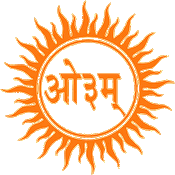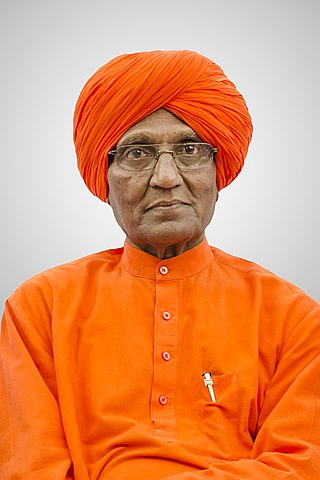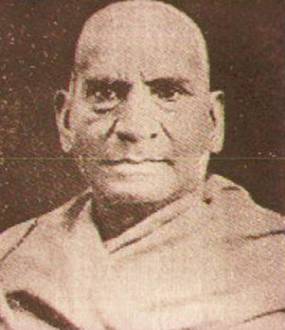Related Research Articles
The following outline is provided as an overview of and topical guide to Hinduism:

Arya Samaj is a monotheistic Indian Hindu reform movement that promotes values and practices based on the belief in the infallible authority of the Vedas. The sannyasi (ascetic) Dayananda Saraswati founded the samaj in the 1870s.

The Arya Samaj was the first religious, cultural and educational Fiji Indian organisation established in Fiji. From its inception, in 1904, it attracted the young, educated and progressive Hindus into its fold. During the first three decades of the twentieth century, it was the sole voice of the Indian community in Fiji and as Fiji Indians won political rights, it was not surprising that first Indian members of the Legislative Council were all Arya Samajis. The influence of Arya Samaj over the Indians in Fiji gradually waned as other organisations representing Indians were established but it remained the dominant force in politics until 1959. The modern day Arya Samaj in Fiji still speaks out on issues affecting its members and its activities are visible through the numerous educational institutions that it manages.

The Sadharan Brahmo Samaj or Universal Brahmo Samaj is a division of Brahmoism formed as a result of schisms in the Brahmo Samaj first in 1866 and then another in 1878.

Swami Agnivesh, was an Indian social activist and the founder of Arya Sabha, a political party based on the principles of Arya Samaj. He also served as a cabinet minister in the state of Haryana. He is best known for his work against bonded labour through the Bonded Labour Liberation Front, which he founded in 1981.
Akhil Bhartiya Jat Mahasabha is a non-political and non-profit organization of Jats in India. The organization was created to raise awareness about the social and economic problems faced by peoples of Jat community. The Jat Mahasabha spearheaded the community's struggle for reservation in the run-up to the Lok Sabha elections in 1999. Sardar Dara Singh was the president, followed by patron Chaudhary Ajay Singh.

The Arya Samaj was founded in Nairobi on 5 July 1903, at a meeting at the home of Jai Gopal attended by forty-five people. The small group of Arya Samajis immediately began plans for a centre for its members and on 11 September 1903, the foundation for the first Arya Samaj building in East Africa was laid. Today there is a seven-storey building on this site.
Arya Samaj has existed in Singapore since 1927 and runs Hindi classes at its premises through the Dayanand Anglo-Vedic Schools System.

Arya Samaj is a Hindu reform movement in Mauritius. Established in 1911, the Arya Paropkarini Sabha was officially registered in 1913. Since its creation Arya Samaj has had a great influence on the religious, social, educational and political lives of the people of Indian origin on the island. It has endeavoured to uphold the principles and ideals set forth by Maharishi Dayanand and his reformist movement. Some of the more notable ideals are women parity and free access to education. It has provided Hindus with a choice of progressive Hinduism, has promoted education with particular emphasis on Hindi and established orphanages, primary schools, colleges and tertiary institution.

The earliest efforts to establish the Arya Samaj in Trinidad and Tobago were made by visiting missionaries in the beginning of the 20th century. In the 1930s their activities led to the establishment of a new organisation, which first was called the Arya Samaj Association, but later was renamed Arya Pratinidhi Sabha of Trinidad. The main activity of the sabha was giving support to the construction of Aryan temples and schools. The organisation was frequently plagued by split-offs, which caused a decrease of its membership.

The Ārya Samāj doctrine, a monotheistic Hindu reform movement that rejects the idea of caste and the exclusive role of brahmins as religious leaders, first arrived in Guyana in the early 1900s with the teachings of Swami Dayanand, but grew rapidly after 1910 after the arrival of missionary Bhai Parmānand. Unlike much of mainstream Hinduism, the movement encourages proselytization and opposes the use of images and idols in worship.

Shraddhanand, born Munshi Ram, was an Indian independence activist and Arya Samaj sannyasi who propagated the teachings of Dayananda Saraswati. This included the establishment of educational institutions, like the Gurukul Kangri University, and played a key role on the Sangathan and the Shuddhi (purification), a Hindu reform movement in the 1920s.
Sanātana Dharma is an endonym for certain sects of Hinduism, and used as an alternative term to the exonyms of Hinduism, including Hindu Dharma. The term is found in Sanskrit and other Indian languages. It is generally used to signify a more traditional outlook of Hinduism.
Adi Dharm refers to the religion of Adi Brahmo Samaj the first development of Brahmoism and includes those Sadharan Brahmo Samajists who were reintegrated into Brahmoism after the second schism of 1878 at the instance of Devendranath Tagore. This was the first organised casteless movement in British India and reverberated from its heart of Bengal to Assam, Bombay State, Punjab and Madras, Hyderabad, and Bangalore.

Narayan Rao Pawar was an Indian independence activist and member of Arya Samaj. He became popular after plotting to kill the last Nizam of Hyderabad, Mir Osman Ali Khan as the Nizam was using his extra-judicial police force, the Rezakars to murder hundreds of Hindus in cold blood

Sangeet Kalpataru is a Bengali language song anthology edited and compiled by Swami Vivekananda and Vaishnav Charan Basak. The book was first published in August or September 1887 from Arya Pustakalaya, Calcutta. In 2000, the book was reprinted by the Ramakrishna Mission Institute of Culture. It was edited with a critical introduction by Dr. Sarbananda Choudhury.
Telangana Language Day is celebrated on 9 September every year in Telangana, India. This date was chosen on the occasion of renowned writer, poet of the Telangana Kaloji Narayana Rao's 100th birth anniversary. The Government of Telangana provides funds and awards for the improvement of Telangana dialect of Telugu.
Dukhan Ram (1899–1990) was an Indian ophthalmologist, academic, legislator and the vice chancellor of Babasaheb Bhimrao Ambedkar Bihar University. He was the principal of Patna Medical College, one of the oldest medical colleges in India, and the president of Arya Pradeshik Pratinidhi Sabha, a satellite organization of Arya Samaj, founded by Dayanand Saraswati. He successfully contested the 1962 Bihar Legislative Assembly election from Sasaram constituency, on Indian National Congress candidature and served as the president of All India Ophthalmological Society in 1961. The Government of India awarded him the third highest civilian honour of the Padma Bhushan, in 1962, for his contributions to medical science.

The Lingayat Vani community is an Indo-Aryan ethnolinguistic group who are native to Maharashtra in western India. They belong to Veershaiv sect of Hindu Shaivism and are also referred to as Veershaiv-Lingayat Vanik or Lingayat Balija or Vira Banajiga or Bir Vanigas. The name Vani is derived from the Sanskrit word 'Vanijya' which means trade.
References
- ↑ Svātantrya sainika caritra kośa: Vidarbha vibhāga (in Marathi). Bhāratīya Svātantrya Āndolana Itihāsa Samitī. 1971.
- ↑ Jainoddin Kumthekar, Bashir. "Digital District Repository".
{{cite web}}: CS1 maint: url-status (link) - ↑ Sayeed, Vikhar Ahmed (2023-11-02). "HISTORY | A tale of two massacres in Hyderabad-Karnataka". Frontline. Retrieved 2024-11-26.
- ↑ "The accession of Hyderabad: the hurdles, the violence, and the eventual success". The Indian Express. 2023-09-17. Retrieved 2024-11-26.